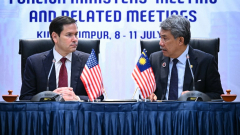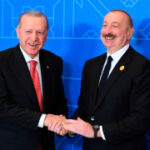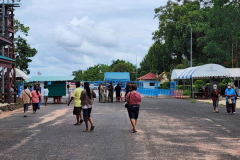China has agreed to sign a Southeast Asian treaty banning nuclear weapons, Malaysia’s and China’s foreign ministers confirmed, in a move that seeks to shield the area from rising global security tensions amid the threat of imminent United States tariffs.
The pledge from Beijing was welcomed as diplomats on Thursday gathered for the Association of Southeast Asian Nations (ASEAN) foreign ministers’ meeting, where US Secretary of State Marco Rubio is also due to meet regional counterparts and Russian counterpart Sergey Lavrov.
Malaysia’s Minister of Foreign Affairs Mohamad Hasan told reporters China had confirmed its willingness to sign the Southeast Asian Nuclear Weapon-Free Zone (SEANWFZ) treaty – an agreement in force since 1997 that restricts nuclear activity in the region to peaceful purposes such as energy generation.
“China made a commitment to ensure that they will sign the treaty without reservation,” Hasan said, adding that the formal signing will take place once all relevant documentation is completed.
ASEAN has long pushed for the world’s five recognised nuclear powers – China, the United States, Russia, France and the United Kingdom – to sign the pact and respect the region’s non-nuclear status, including within its exclusive economic zones and continental shelves.
Last week, Beijing signalled its readiness to support the treaty and lead by example among nuclear-armed states.
Rubio, who is on his first visit to Asia as secretary of state, arrived in Kuala Lumpur on Thursday amid a cloud of uncertainty caused by President Donald Trump’s aggressive tariff strategy, which includes new levies on six ASEAN nations as well as key traditional allies Japan and South Korea.
The tariffs, set to take effect on August 1, include a 25 percent duty on Malaysia, 32 percent on Indonesia, 36 percent on Cambodia and Thailand, and 40 percent on Laos and Myanmar.
Japan and South Korea have each been hit with 25 percent tariffs, while Australia – another significant Asia Pacific ally – has reacted angrily to threats of a 200 percent duty on pharmaceutical exports to the US.
Vietnam, an ASEAN nation, along with the UK, are the only two countries to have signed separate trade deals with the US, whose administration had boasted they would have 90 deals in 90 days.
The US will place a lower-than-promised 20 percent tariff on many Vietnamese exports, Trump has said, cooling tensions with its 10th-biggest trading partner days before he could raise levies on most imports. Any transshipments from third countries through Vietnam will face a 40 percent levy, Trump said, announcing the trade deal on Wednesday. Vietnam would accept US products with a zero percent tariff, he added.
Reporting from Kuala Lumpur, Al Jazeera’s Rob McBride says Southeast Asian nations are finding themselves at the centre of intensifying diplomatic competition, as global powers look to strengthen their influence in the region.
“The ASEAN countries are facing some of the highest tariffs from the Trump administration,” McBride said. “They were also among the first to receive new letters announcing yet another delay in the imposition of these tariffs, now pushed to 1 August.”
![Family photo of the attendees of the Association of Southeast Asian Nations (ASEAN) Post-Ministerial Conference with Russia during the 58th ASEAN Foreign Ministers meeting and related meetings at the Convention Centre in Kuala Lumpur on July 10, 2025. [Mohd Rasfan/ AFP]](http://www.aljazeera.com/wp-content/uploads/2025/07/000_66CV49R-1752135088.jpg?w=770&resize=770%2C480&quality=80)





